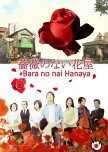"The gentle and sad Florist-san."
This quote (by Shirato Mio) properly describes the complex Shiomi Eiji in a few words. The first thing that I really noticed about Eiji was this incredible sadness in his eyes and in the corners of his smiles. His smiles are bittersweet at best; he's quiet, pensive, kind--almost too kind, as though he can never be anything else.
I could only heap praises on Katori Shingo for this understated, delicate portrayal of a man who has numerous scars but tries his best to liberate himself from them. At the beginning, I was struggling to understand this enigma of a person: does he truly mean the things he says? When he says it's fine, is it really? Why does he always view himself as undeserving? Why is there so much sadness integrated into his whole being? I wanted to understand so badly and by the end, I was satisfied with my conclusions.
The plot itself is convoluted and hard to buy but I was able to go beyond that 'revenge' premise to what's truly gold about this show: the characters and the bonds between them.
Eiji's relationship with his daughter, the cute Shizuku, was one of the most moving father-daughter relationships I've ever seen in a drama. And it's a bonus that Shizuku is a level-headed child who is both kind and sweet, though without being saccharine.
Unexpectedly, there were also a few twists in the drama which kept the drama going. While I can't really talk about them, I could just say that they fit well in the story.
I'm so glad that I picked this to watch because the last Japanese drama I've seen was around four years ago (I know, I'm ridiculous). 'Bara No Nai Hanaya' made me remember all the things I loved and appreciated about Japanese dramas. I truly recommend this show and hope you like just as much as I did.
Considerați utilă această recenzie?























